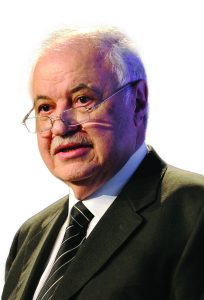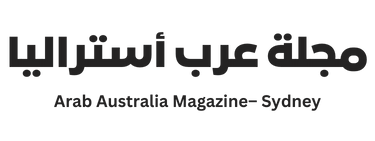مجلة عرب أستراليا سيدني- التحول الرقمي في العالم الجديد

بقلم الدكتور طلال أبوغزاله
لقد تسببت جائحة كورونا خسائر فادحة وأثرت سلبيًا على قطاعات الأعمال في جميع أنحاء العالم بطريقة مقلقة للغاية. وفي محاولة لتقليل ذلك التأثير، تسارعت الشركات على التقنيات الرقمية للحفاظ على مستوى معين من التشغيل خلال فترة صعبة بالنسبة لنا جميعًا. ولكن، وفي كثير من الحالات، بطريقة عشوائية تفتقر إلى التخطيط الجيد.
أما بالنسبة لنا في شركة طلال أبو غزاله العالمية، فلم يتسبب الوباء سوى بالقليل من الاضطراب، حيث تم دمج تكنولوجيا المعلومات في نسيج المؤسسة، مما يعني أن أدوات الإنتاجية كانت في مكانها الصحيح، حيث سمحت لنا بمواصلة العمل مع عملائنا في جميع أنحاء العالم. ومع ذلك، عانت العديد من المؤسسات بشدة نتيجة عدم وجود بنية تحتية قوية لتكنولوجيا المعلومات، ونتيجة الافتقار إلى عاملين في مجال المعرفة الرقمية مؤهلين تأهيلًا جيدًا لامتصاص الصدمة التي أحدثها فيروس كورونا.
بعد الجائحة، أعتقد أنه يجب علينا جميعًا، لا سيما أولئك الذين لم يكونوا مستعدين بشكل كافٍ، أن نحلل بعناية ما حدث خلال العامين الماضيين من أجل إعداد أنفسنا بشكل أفضل للمستقبل. لقد استشارتني العديد من المنظمات واللجان الدولية حول الأسئلة التي يجب طرحها الآن للاستعداد بشكل أفضل للمستقبل . بالنسبة لي، سأبدأ بالأسئلة التالية:
- هل منظماتنا مستعدة للعمل عن بعد من منظور التكنولوجيا والموظفين؟
- هل استثماراتنا في تكنولوجيا المعلومات تؤتي ثمارها خلال فترة الأزمة؟
- ما هي القدرات التي كنا نفتقر إليها والتي نحتاج إلى توفيرها لتجنب وضع مماثل في المستقبل؟
أعتقد أننا جميعًا نحتاج إلى تغيير طريقة تفكيرنا والبحث في كيفية تحويل مؤسساتنا إلى شركات تكنولوجيا معلومات. وهذا بالتحديد ما قمت به عندما أنشأت شركة أبو غزالة للملكية الفكرية؛ وهي شركة تكنولوجيا معلومات يديرها متخصصون في المجال، مما يضمن تداخل التكنولوجيا في كل عملياتها باعتبارها أكبر شركة ملكية فكرية في العالم.
توفر التقنيات الحديثة مثل الذكاء الاصطناعي والسحابة الإلكترونية وتقنيات العمل عن بُعد وغيرها طرقًا مفيدة لجعل أماكن العمل أكثر ذكاءً وأكثر مرونة واستجابة للتغيير. والمفتاح لذلك هو وضع إستراتيجية لتكنولوجيا المعلومات والبدء في الاستثمار في هذه المرونة بحيث تكون جميع العناصر في مكانها الصحيح لضمان استمرار العمل خلال الأوقات الصعبة.
بعد أن ساعدت العديد من المنظمات الدولية في تطوير استراتيجيات تكنولوجيا المعلومات لتمكين جهود التحول الرقمي، أود أن أقترح أن تستخدم المؤسسات المعنية ما يلي كإطار عمل للمساعدة في تطوير إستراتيجية عملية لتكنولوجيا المعلومات يمكن تطويرها بسهولة وسرعة:
- تحديد العمليات والأنشطة التجارية الرئيسية التي يجب أن تكون فعالة أثناء الأزمة؛ ويجب أن يشمل هذا الأشخاص والعمليات والتكنولوجيا.
- إجراء تحليل فجوة لوضع شركتك الحالي فيما يتعلق بالقدرات المطلوبة، مما يساعد في تحديد نقاط الضعف والقوة والفرص والتهديدات للمساعدة في تحديد الثغرات.
- تحديد المشاريع التي يمكن تنفيذها للتخفيف من الفجوات التي ينبغي تطويرها مع مراعاة المبادئ الذكية) المحددة والقابلة للقياس والقابلة للتحقيق وذات الصلة والمقيدة بزمن( إلى جانب تكاليف الميزانية.
- وضع خطة لتحديد الأولويات وتنفيذ المشاريع على أساسها وبدعم من مجالس الإدارة.
لقد وجد الاستشاريون في الشركة الاستشارية لتكنولوجيا المعلومات، “طلال أبو غزالة لتقنيات المعلومات الدولية”، في كثير من الأحيان أن الانخراط في مثل هذه المشاريع مفيد للإدارة لأنه يوفر رؤية شاملة للمؤسسة وقدراتها؛ وكذلك العمليات/ الأقسام التي قد تحتاج إلى تطوير. عند إدارة منظمة من السهل جدًا أن تنشغل في الإدارة اليومية لها، لذلك يسمح القيام بمثل هذا التمرين بتحديد المشكلات وإدخال التحسينات.
تحقيقًا لهذه الغاية، فإنني على أتم الاستعداد لدعم ومساندة أي منظمة تتطلع إلى تطوير إستراتيجية قوية لتكنولوجيا المعلومات بطريقة مستقلة وغير جزئية بخبرات مستشاري تكنولوجيا المعلومات لدينا، لتمكينهم من التحول الرقمي في العالم الجديد.
Going Digital in the New Normal
Talal Abu-Ghazaleh
The pandemic has taken a heavy toll on the world and has affected business sectors across the globe in amanner that has been quite alarming. In an attempt to minimize the impact the pandemic brought, businesses desperately turned to digital technologies to maintain some level of operation through what was a testing time for us all. This was done in many instances in a haphazard, random manner with little planning.
For us at TAG.Global, the pandemic brought minimal disruption as IT has been woven into the fabric of the organization, meaning that we had the productivity tools in place to continue business with our clients around the world. Many organizations however were not so lucky and suffered quite badly as a result of not having a robust IT infrastructure and well qualified digital knowledge workers in place which could absorb the shock that COVID brought.
Post pandemic, I believe that all of us, particularly those that were not adequately prepared, should carefullyanalyze what happened over the past two years in order to better prepareourselves for the future. I have been asked by many international organizations and committees about what questions they should now be asking to better prepare for the future. I would start of by asking:
?Were our organizations prepared for remote working both from technology and personnel perspectives
?Did our investments in ITtechnologies pay off during this time of crisis
?In hindsight, what capabilities were lacking that we need to havein place to avoid a similar situation in the future
I believe that each one of us needs to be shifting mindset and thinking about how we can turn our companies into IT companies. This is what I did when I established Abu-Ghazaleh Intellectual Property (AGIP). AGIP is an IT firm whose management are IT professionals, ensuring that technology is part of its every operations as the largest intellectual property firm in the world.
Modern technologies such as AI, the cloud, remote working technologies and others, provide useful ways to make workplaces smarter, more agile and responsive to change. The key is to put together an IT strategy and start investing in this flexibility so that all the elements are in place to ensure that business continues hindered during challenging times.
Having assisted many international organization develop IT strategies to enable their digitaltransformation efforts, I would suggest that organizationsuse the following as a framework to help develop a pragmatic IT strategy that can be developed easily and rapidly:
Identify what key business processes andactivities need to be functional during a crisis. This should include people, processes and technology.
Perform a gap analysis of where your company currently stands in relation to the required capabilities. This will help to identify strength weakness, opportunities and threats to help identify gaps.
Identify projects that can be implemented to mitigate the gaps which should be developed with SMART principles in mind along with budgetary costs.
Put together a project plan for the prioritization and implementation of these projects with support from C level management
Our IT consultancy firm TAGITI, have quite often found that engaging in such projects proves to be a useful for management as it provides a 360 degree view of the organization, its capabilities, as well as what processes/departments may be out of shapeand need improving. When running an organization,it is all too easy to get lost in the daily management of it. Undertaking an exercise like this allows for issues to be identified and improvements to be made.
To this end, I extend the expertise of my IT consultants to any organization looking to develop a robust IT strategy in an independent and non-partial manner to enable them to go digital in the new normal.
رابط مختصر..https://arabsaustralia.com/?p=22160




